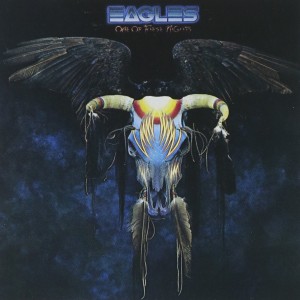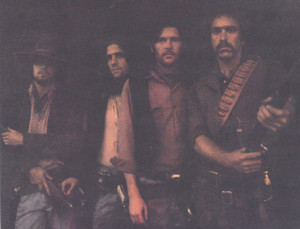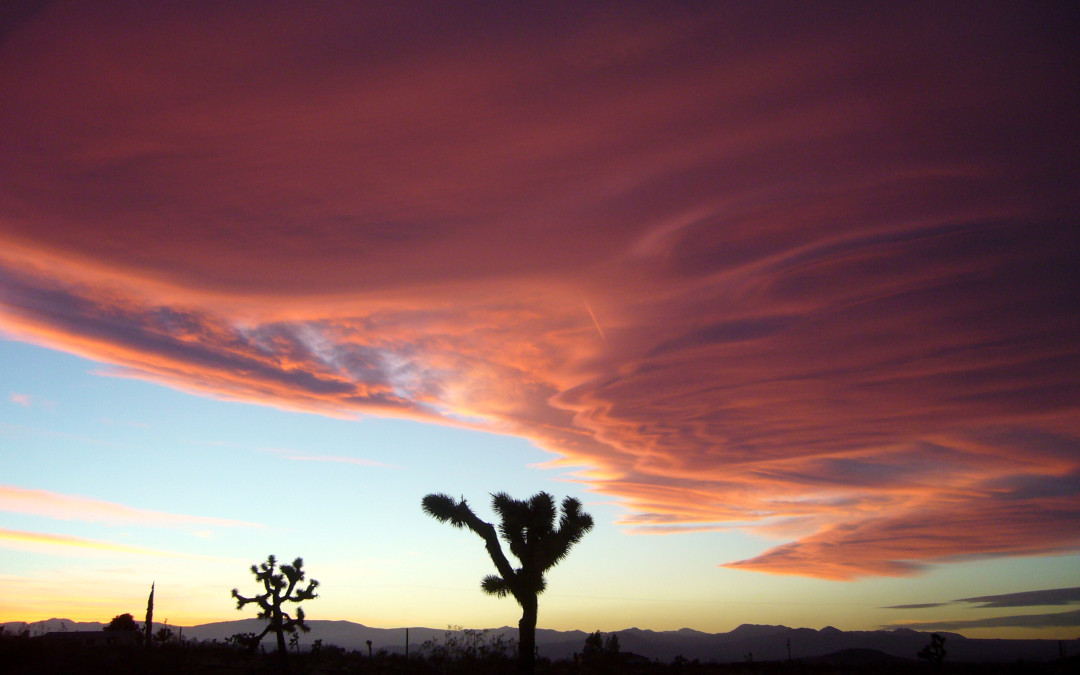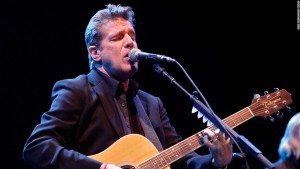Despite Mojo Nixon’s entreaty that “Don Henley Must Die,” in the end it was Glenn Frey who went first, succumbing to multiple illnesses including rheumatoid arthritis, acute ulcerative colitis and pneumonia at the age of 67. The Eagles were the most popular American group of the ’70s, among the top selling groups of all time, but against the grain of such mass appeal, it was the intimate, spooky desert magic of Frey that made them what they were.
Glenn Frey co-wrote or gathered most of the Eagles songs; played rhythm and lead guitars; sang lead on such era-defining classics as “Peaceful Easy Feeling,” “Tequila Sunrise,” “Take It Easy,” “Outlaw Man,” “Ol’ 55,” “Already Gone,” “Lyin’ Eyes,” and “New Kid in Town”; arranged the band’s chilling harmonies; and was the visionary behind the vast desert landscapes of the mind that fueled the band’s early greatness.
 From the Eagles’ original position as a pleasant, easy going, almost anonymous outfit, they could slip in truths
From the Eagles’ original position as a pleasant, easy going, almost anonymous outfit, they could slip in truths without seeming contrived or pretentious. They had charm. They evoked a desert Southwest of the mind that was endless and spooky, yet intimate and personal.
without seeming contrived or pretentious. They had charm. They evoked a desert Southwest of the mind that was endless and spooky, yet intimate and personal.
By the time of their highly publicized recruitment of guitar hero Joe Walsh prior to Hotel California, the Eagles went from overachieving upstarts to defending champions. This is a familiar transformation in sports: the underdog rises through the pack and becomes champ. Every other team gets particularly geared up to play the champions – beating the champs gives a struggling team hope.
The defending champion mentality affects the champs as well: they feel the pressure of heightened expectations. They don’t play to win, they play not to lose. The joy of playing gets lost somewhere. The team may bring in high-priced hired hands to shore up perceived weaknesses, but they also may forget how they got to the top in the first place.
All of the above happened to the Eagles, the first rock band of the free agent era. The problem wasn’t Walsh per se, it was the “now they’ll REALLY achieve greatness” mentality that accompanied him into the group. There was an ease to the pre-Walsh Eagles. They moved as a unit. They functioned as a pack. The latter-day Eagles felt more like high-priced session men backing up each other’s projects than a group of peers.
 The band’s sound and iconography changed along with its mentality. Their pre-Walsh albums (Eagles, Desperado, On the Border, One of These Nights) breathed. There are spaces in the surface of the music that afford clean, dry ventilation, like cotton or fine spun wool. The holes closed up on Hotel California and the material didn’t breathe: it was slicker but caused discomfort in the long run.
The band’s sound and iconography changed along with its mentality. Their pre-Walsh albums (Eagles, Desperado, On the Border, One of These Nights) breathed. There are spaces in the surface of the music that afford clean, dry ventilation, like cotton or fine spun wool. The holes closed up on Hotel California and the material didn’t breathe: it was slicker but caused discomfort in the long run.
The band changed stylistically as well. When they traded the bluegrass-based Bernie Leadon for the ’70s-rock based Joe Walsh, they lost their contact with the desert: their source of high-lonesome inspiration. Gone were the banjos, the pedal steel, the fancy finger picking that had informed even their most un-Western material. The falsetto R&B vocals of “One of These Nights” were somehow “Western” R&B vocals.
When the Eagles looked out over the city lights of L.A. in “Lyin’ Eyes” or “Hollywood Waltz’” they saw the city for what it really was: an irrigated desert. They saw the ancient smoke of native American campfires backing up against the San Gabriel Mountains. The Detroit transplant Frey captured the spooky awe of an endless painted desert sky just beyond the edge of town, a place where one could still feel at one with the universe, with cacti reaching heavenward and the bleached skull of a cow a stark reminder of mortality.
When I listen to the warm dry breezes of “Peaceful Easy Feeling,” or “Tequila Sunrise,” or “Lyin’ Eyes,” I remember an incident from my childhood: When I was ten my family lived a few doors down from an open field of Southern California sage, tumbleweeds, sun-beaten dust, and desert critters. Kids rode dirt bikes and flew kites and went on hikes and searched for old spent shells from the WWII firing range, a place where Southern California confronted its former self.
One fall day, I went to the field to practice my boomerang – the real thing that my grandmother had brought back from Australia. I gave the stick a mighty heave and it swung out in a beautiful, soaring arc. Unfortunately my trajectory was off and the boomerang landed in a forbiddingly tangled mess of prickly brush. Heedlessly I charged through the crackling brown tangle, and spotting the hole that the boomerang had neatly sliced through the brush, I reached down to claim my prize.
I was momentarily confused when my hand connected with something smooth, firm and circular. Then it rattled. I nearly yanked my arm out of the socket as I extracted it from the hissing brush. To my added horror, the rattler had lodged a fang in my shirtsleeve and it came twisting out of the tangle following my arm.
Freaked, I swung my arm over my head in a feverish calf-roping motion and the writhing menace broke free, pinwheeling through the air and landing with a pronounced thud somewhere behind me.
I sprinted all the way home – feet barely touching the ground. The desert is not to be trifled with. The field was replaced some years later by a luxury mobile home park with begonias and imported palms: a mobile Hotel California.
The music and laconic persona of Glenn Frey is profoundly tangled with these memories in my mind. May he rest in easy peacefulness.












Share This
Share this post with your friends!